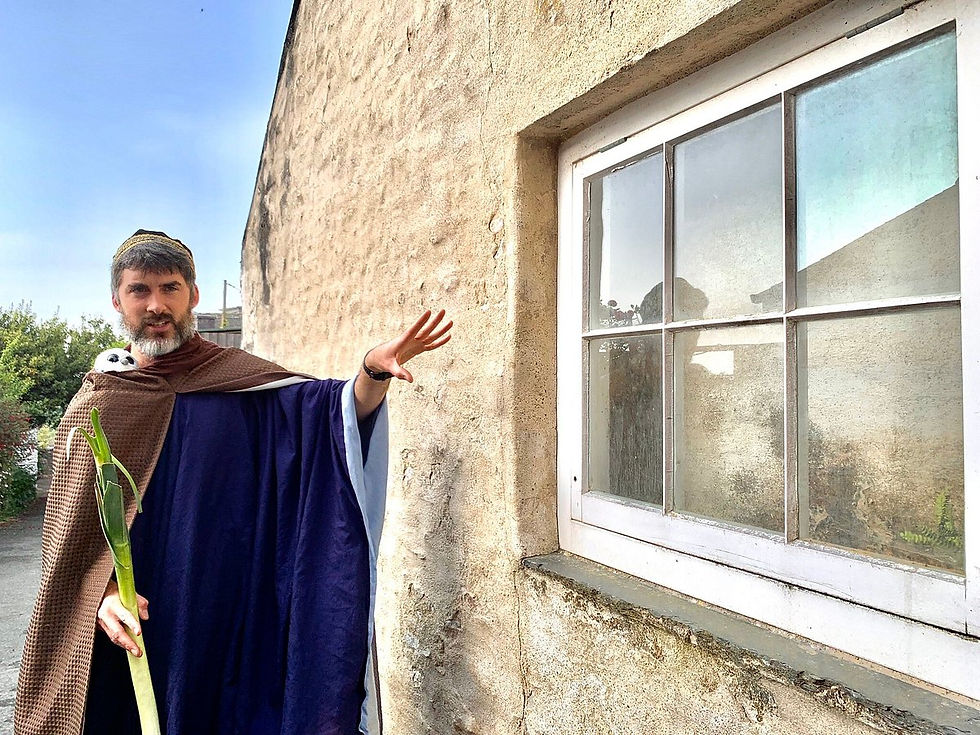Royal Society for the Protection of Monks Calls for Responsible Tourism in Pembrokeshire
- firedonkeyproducti
- Aug 1, 2023
- 3 min read

Pembrokeshire, August 2023 - In the enchanting landscape of Pembrokeshire, where nature and spirituality converge, the Royal Society for the Protection of Monks (RSPM) urges visitors of Pembrokeshire National Parks to practice responsible and respectful tourism when encountering monks roaming freely along the coastpath. The RSPM, dedicated to safeguarding our proud monastic heritage, implores visitors not to take any monks home with them, particularly the smaller ones that fit inside bags, as these beings are not pets, but esteemed custodians of ancient wisdom.
The Pembrokeshire coastpath offers a unique and serene experience for visitors, drawing them close to the ancient pilgrimage routes where monks stroll peacefully, seeking solace amidst the breath-taking beauty of the land. As these spiritual guardians move harmoniously with nature, it is crucial that tourists respect the sacred bond between the monks and their natural habitat.
Sir Desmond Cheevely, President of the Royal Society for the Protection of Monks, emphasized, "We deeply appreciate the interest and admiration visitors have for our revered monks and their spiritual pursuits. However, it is of utmost importance to remember that these esteemed souls are not domestic animals but bearers of a profound spiritual and historic legacy. We appeal to all visitors to Pembrokeshire to cherish this sacred relationship from a distance and not disrupt the equilibrium that exists between these venerable beings and their surroundings. For terrible things may occur, such things as I cannot express. Terrible things though, terrible things."
Monks have lived in communion with nature for centuries, embodying values of simplicity, peace, and enlightenment. By refraining from taking them home as pets, tourists play a vital role in maintaining the balance of this time-honoured bond and preserving the very essence of their spiritual journey. Plus you can give them all sorts of diseases which can really negatively impact the Pembrokeshire ecosystem.
The Royal Society for the Protection of Monks urges visitors to embrace responsible tourism practices, including:
1. Observe from a Distance: While observing the monks on their sojourns through the Pembrokeshire National Park, maintain a respectful distance to avoid causing disturbance or undue stress to these revered individuals.
2. Refrain from Touching or Feeding: As a sign of respect, do not attempt to touch or feed the monks, as this may disrupt their spiritual reflections and natural harmony. Offering bread and mead to wild monks may seem like fun at first but you may create a state of dependence and end up with monks following you around looking for more bread or mead.
3. Capture Moments Respectfully: If you wish to capture the experience through photography, do so discreetly and without intruding on the monks' privacy.
4. Spread Awareness: Help us protect the sanctity of the monastic heritage by educating fellow tourists and promoting responsible tourism practices. Join the St Davids Comedy Walking Tour or come to the annual Monkspotting event at Halloween, to learn more about what you can do.
5. Support Conservation Efforts: Consider contributing to organizations like the Royal Society for the Protection of Monks that work tirelessly to preserve and protect the cultural and spiritual heritage of Pembrokeshire.
Together, we can ensure that the spiritual guardians of Pembrokeshire continue their divine quest, inspiring generations to come with their wisdom and grace.
Let us unite in our commitment to preserve the unique and timeless bond between the monks and their natural habitat, and ensure that Pembrokeshire remains a sanctuary of spiritual solace for all.
About the Royal Society for the Protection of Monks: The Royal Society for the Protection of Monks is a non-profit organization dedicated to safeguarding the spiritual and historic monastic heritage of Pembrokeshire. Founded in 1865, originally as a monk-hunting for sport organisation, the RSPM works tirelessly to promote responsible tourism, conservation efforts, and the preservation of monastic traditions in harmony with nature.




Comments